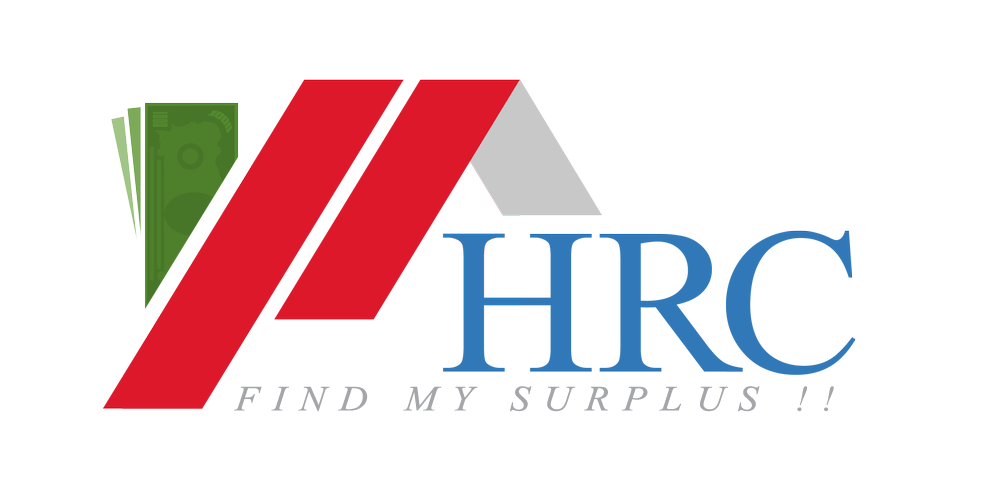FAQ
How can I redeem my Redeemable Check?
 Redeemable checks are intended for the rightful homeowner. Redemption of the check is subject to verification and acceptance of your application. Fill in the form on the Redeemable Check page. HRC will check and verify that you are the rightful homeowner of the foreclosure, and assets are owed to you. This means your name has to be legally on the deed of that property on the date of foreclosure. This is of course required for HRC to recover any assets owed. Applicants not legally the homeowner at the date of foreclosure, are not eligible for redemption of the redeemable check, or the HRC assets recovery service. If you are, then yes, we are happy to honor your redeemable check, and perform this assets recovery service for you.
Redeemable checks are intended for the rightful homeowner. Redemption of the check is subject to verification and acceptance of your application. Fill in the form on the Redeemable Check page. HRC will check and verify that you are the rightful homeowner of the foreclosure, and assets are owed to you. This means your name has to be legally on the deed of that property on the date of foreclosure. This is of course required for HRC to recover any assets owed. Applicants not legally the homeowner at the date of foreclosure, are not eligible for redemption of the redeemable check, or the HRC assets recovery service. If you are, then yes, we are happy to honor your redeemable check, and perform this assets recovery service for you.
What do I have to do to start this assets recovery process?
Simple; Call us or go to our Redeemable Check page, and fill in the application form.
This is a redeemable check; why can't I just redeem it for cash?
Redemption of the check is subject to verification of being the rightful homeowner and acceptance of buyout offer. HRC has to first verify that you are the rightful homeowner of the foreclosure, and your name matches that person on that deed as the homeowner on that date of that foreclosure. If your name is not on that deed at the time of foreclosure then you are not the rightful homeowner to be eligible to redeem the redeemable check.
How is it possible I have money coming to me? What is a “Surplus”?
The principal is simple to understand: In a foreclosure, the bank takes possession of your home, and sells it at a foreclosure Real Estate sale by auction for whatever they can get. HOWEVER, homeowners don’t realize there may be cash assets left over after this sale by auction, called a “Surplus.” This Surplus can be thousands, even tens of thousands of dollars that is rightfully YOURS for the asking!
For example: If you owed the bank $200k mortgage debt, the bank foreclosed on your home in order to recover that $200k debt. However, if the home was sold at auction for $250k, the difference between the debt ($200k), and what the home sold for ($250k) is $50k, and is what is called a “Surplus.”
This is rightfully YOUR money!
How much is the claim?
Depends on your unique situation. If we contacted you, and/or if you received a redeemable check, we have already done the preliminary research and we already know you have monetary assets owed you, and rightfully yours for the asking. We do not contact homeowners unless there is at least $25,000 in gross amount being held.
How much can I expect to receive?
Depends on your unique situation. We have private resources that will make you an offer based on amount, risk and cost.
Where is the money being held?
Depends on your unique situation. Monies are often held in estates, overages, unclaimed insurance, eminent domain, condemnation files, etc.
How long does it take to get paid from a recovery? When will I get funded?
Providing that a Buyout offer is accepted, HRC gives the homeowner part of the expected claim up front in the form of a “Redeemable Check,” and then the rest when the attorney retrieves the total claim. Processing times varies, but depending on the source of the funds and the funds holder, it can take up to 3 months. Please allow adequate time.
Do I have to pay anything?
No. HRC pays all costs. We never bill you.
Can I claim this money without you?
Yes. You will need an attorney. We do not share fund location or procedures. We work with creditors on your behalf.
My foreclosure was years ago… Is there a deadline to claim these funds?
Yes, depending. We may be able to recover your assets even if your mortgage foreclosed many years ago. But often we have a very short window of opportunity to make claim in order to get maximum claim amounts. Time is of the essence always. Act now, and get your claim started today!
Will I be taxed on the monies recovered?
Many funds holders will ask for a 1099, W2 or W9 tax form. They will count the entire amount of the funds paid out as income to you. However, you should be provided with a letter from the attorney who handles your file, showing the actual amount received by you. Consult your tax professional for more information.
